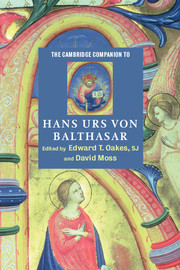17 - Balthasar and Karl Barth
from Part IV - Contemporary encounters
Published online by Cambridge University Press: 28 May 2006
Summary
INTRODUCTION
Hans Urs von Balthasar and the great Swiss Reformed theologian Karl Barth (1886-1968) enjoyed a long and mutually but asymmetrically important relationship. On Barth's side, Balthasar was - with the possible exception of the Jesuit Erich Przywara, whom Barth got to know when he taught in Münster - his most significant Roman Catholic interlocutor. From the mid-1920s, Barth took Roman Catholic theology very seriously (the decisive early text is a searching lecture from 1928 on 'Roman Catholicism: a Question to the Protestant Church'), enjoying cordial relations with Catholic thinkers, studying Catholic texts in his seminar, and observing the changing life of Roman Catholicism: his last major trip was to Rome in 1966 to talk to those involved with the Second Vatican Council. But though Balthasar was Barth's most enduring contact with the Catholic world, he did not shape Barth's theology in any decisive way. Partly this was because when the two first came into contact early on in the Second World War, Barth was already the commanding figure of European Protestantism; he was Balthasar's senior by almost twenty years, and the direction of his magnum opus was already well set. Moreover, for all Barth's intense curiosity about all sorts of expressions of Christian faith, he was a good deal less receptive than Balthasar, and in the Church Dogmatics he is more explicitly in discussion with the classical thinkers of the Christian past than he is with his contemporaries. What cannot be doubted is that Barth thought very highly of Balthasar, both as a leading figure in a promising 'christological renaissance' in modern Catholic theology, and as an interpreter of his own work, one in whom he found 'an understanding of the concentration on Jesus Christ attempted in the Church Dogmatics, and the implied Christian concept of reality, which is incomparably more powerful than that of most of the books [on my theology] which have clustered around me'.
- Type
- Chapter
- Information
- The Cambridge Companion to Hans Urs von Balthasar , pp. 241 - 255Publisher: Cambridge University PressPrint publication year: 2004



